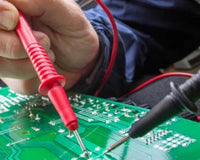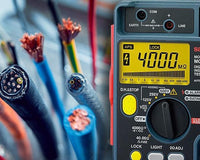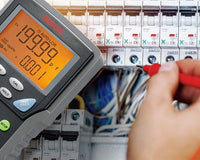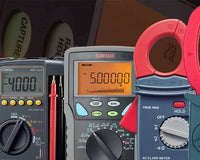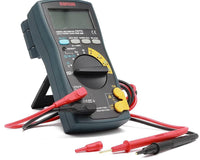What is True RMS?

You might have come across the word ‘True RMS’ when looking for a new digital clamp meter or a multimeter. This term alone can influence your choice when it comes to buying one of these measuring instruments. So let's discuss what True RMS is and why it is so important.
Also see:
What is RMS?
Before jumping directly to True RMS, we need to know what RMS is itself. RMS stands for ‘Root Mean Square’, it is a term used for time-varying voltage signals such as a sinusoidal voltage signal that we often get in our power outlets. The value of an AC voltage is continuously changing from zero up to the positive peak, through zero to the negative peak, and back to zero again.
The RMS value of a varying voltage or current is its' effective value. The corresponding steady DC (constant) value produces the same result.

What is a Peak Value?
The Peak value is simply the maximum value of a sine wave and is . In most parts of the world, the power outlets have an RMS value of 220 Volts which roughly calculates to 311 Volts peak. The reason why we don’t use peak value is that it is not suitable to run our appliances on it.
Do Multimeters show RMS or Peak value?
Multimeters display the RMS value of an AC voltage source, depending on the features they can also display the peak value which is DC circuit can also be measured for an RMS value, provided that the output varies quickly.
Why do I need a True RMS multimeter?
We all know that not all loads have pure sinusoidal waveforms, which makes it difficult to find accurate readings. Having a True-RMS multimeter takes care of the problem. It can measure both pure and non-sinusoidal waves with a certain level of accuracy.
Average VS True RMS Multimeters
There are many older multimeter models that use the Averaging technique to accurately measure sinusoidal and non-sinusoidal signals with uncertain accuracy. While a True RMS multimeter is more accurate as it calculates the square of the instantaneous value of the input voltage or current, averages it over time, and displays the square root of this average making the measurement more accurate for both pure and non-sinusoidal signals.
Applications for a True RMS multimeter
Since True RMS multimeters provide more accurate results their usage has increased in many applications where accurate results are paramount.
- HVAC systems: Also known as the Heating, ventilation, and air conditioning systems. A True RMS multimeter is crucial for testing systems as most HVAC systems operate on high power and hence would require top grade and accurate measuring instruments.
- Electric Vehicles: With the rise of electric vehicles, it is important to own a more accurate True RMS multimeter when maintaining an electric vehicle.
- Computer Systems: Computer systems are getting sophisticated as we progress, and having accurate testing hardware is very important. True RMS multimeters could easily measure AC signals with more accuracy; however, they cannot replace an oscilloscope when it comes to signal analysis.
- Variable Motor Drives: Motor drives operate on high AC voltage; hence a True RMS multimeter would be a great investment when it comes to accurately measuring all the necessary parameters.


